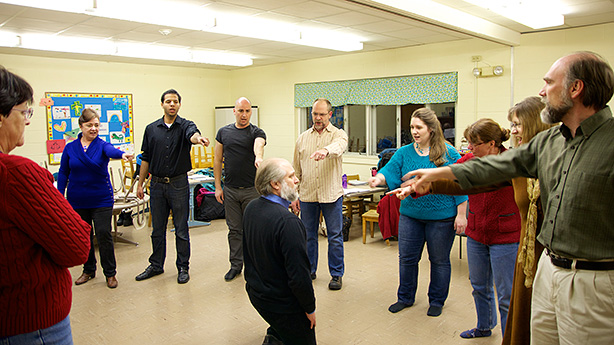
During a Jan. 28 rehearsal, members of the cast of "Jennie's Will" stage the song "Guilty as Sin," in which Willard Fiske (Mark Lawrence, center) hears voices in his head condemning him for exploiting the fragile Jennie McGraw (Karen Dumont, not pictured). Photo: Joe Wilensky.
History, courtship, controversy and the Cornell Chimes:
All part of musical 'Jennie's Will'
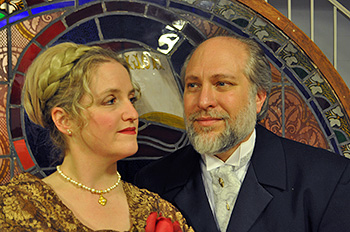
Karen Dumont, DVM '02, as Jennie McGraw and Mark Lawrence as Willard Fiske in The Cornell Savoyards and School of Continuing Education and Summer Sessions' production of the musical "Jennie's Will," scheduled for Feb. 7 and 8 in Barnes Hall. Photo: Lisa Frank.
The graceful McGraw Tower has been Cornell University's beacon to the campus, the community and the world since 1891. The chimes housed at its top first rang out at the university's inauguration in 1868 and have resounded almost every day since then.
The story of the chimes and their donor, Jennie McGraw, of Dryden, is a savory one, full of interpersonal friction, class conflict, litigiousness and -- the sine qua non of every drama -- romance. Originally commissioned by the Town of Dryden to celebrate its bicentennial and produced in 1997, "Jennie's Will," a musical history in two acts, was composed by Mark Simon (DMA '85), with libretto by Pamela Monk.
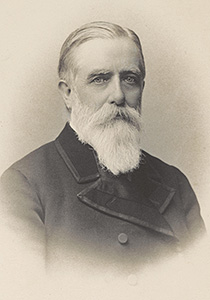
Willard Fiske. Photo: Division of Rare and Manuscript Collections.
"Jennie's Will" is being staged again in February in honor of Cornell University's sesquicentennial.
The play explores the controversial marriage of the heiress to the McGraw lumber fortune with Cornell's first librarian, scholar Willard Fiske, whose courtship was flatly rejected by Jennie's overprotective and class-conscious father, John McGraw, who refused to allow his daughter to marry "down." Indeed, it was only after the death of the tycoon that Jennie was free to wed. But, tragically complicating matters, Jennie, always frail and suffering from tuberculosis, survived for only 18 months after the wedding, dying in 1881 at the age of 41. In her will, she left very little to her new husband and the vast majority to the university.
A nasty legal fight ensued. Fiske eventually won, leaving a stain on his already dubious reputation as a gold-digging opportunist. And even though Fiske bequeathed his estate to Cornell, the controversy persists to this day.
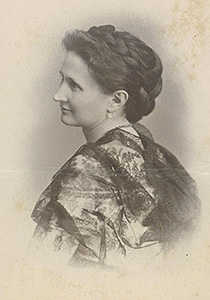
Jennie McGraw. Photo: Division of Rare and Manuscript Collections.
The chimes Jennie donated figure prominently in the score of the show. "[Jennie's] relationship with Willard Fiske is presented as an hour struck by the clock," says Simon. "The quarter-hour chimes early in the first act, the half-hour chimes right at the end of the first act finale, the three-quarter hour chimes at the beginning of the second act, and finally, the on-the-hour chimes, with the bell tolling Jennie's death. The chimes also tell you that a certain amount of time has passed between the two acts. And, of course, the wedding bells had to be the 'Jennie McGraw Rag'" (a tune, familiar to Cornellians, played every morning by chimesmasters).
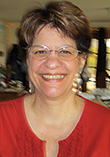
Rachel Hockett
The Cornell Savoyards, a venerable institution in their own right (founded in 1953), will present "Jennie's Will" as part of the School of Continuing Education and Summer Sessions' celebration of the sesquicentennial.
Ties to Cornell abound among the show's company. Karen Dumont ("Jennie") is a Cornell DVM ('02). Mark Lawrence ("Will") is Web and communications manager for the Atkinson Center. Kristen Park, reprising the role of "Mrs. Fiske," earned her master's degree from the Dyson School of Economics ('99) and works in market research for the university. Robin Booth ("Female Conscience") and Douglas Mathews ("Andrew White") also appeared in the original 1997 production. Lisa Frank ("Lettie") is assistant art director at Cornell Alumni Magazine.
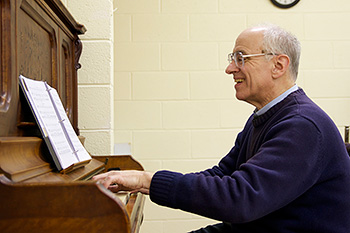
Bill Cowdery '73, M.A. '81, Ph.D. '89, on piano during a "Jennie's Will" rehearsal Jan. 28. Cowdery is music and orchestra director for the production. Photo: Joe Wilensky.
Katrina Kuka ("Robella"), Geoffrey Peterson ("Male Conscience"), Stan Stewart ("McGraw/Boardman"), and Dan Taylor ("Mathias") complete the ensemble.
Stage manager Ellie Hobbie '74 is a fourth-generation Cornellian, and costume designer Melissa Snyder serves as publications assistant for the ILR Review. William Cowdery '73, M.A. '81, Ph.D. '89, music and orchestra director, is a member of Cornell's music library staff. Director Rachel Hockett is the daughter of two Cornell professors.
"Jennie's Will" will be performed Feb. 7 at 8 p.m. and Feb. 8 at 3 p.m. at Barnes Hall; the shows are free and open to the public. Early arrival is recommended, both to secure a seat and to hear a chimes concert from the adjacent McGraw Tower, which will precede each performance. The Savoyards will again perform the show in concert for the Dryden Historical Society on Feb. 28.
Rachel Hockett is director of the Cornell Savoyards' upcoming production of "Jennie's Will," a member of the first class of undergraduate women at Yale University ('73) and artistic director of Ithaca's Homecoming Players.
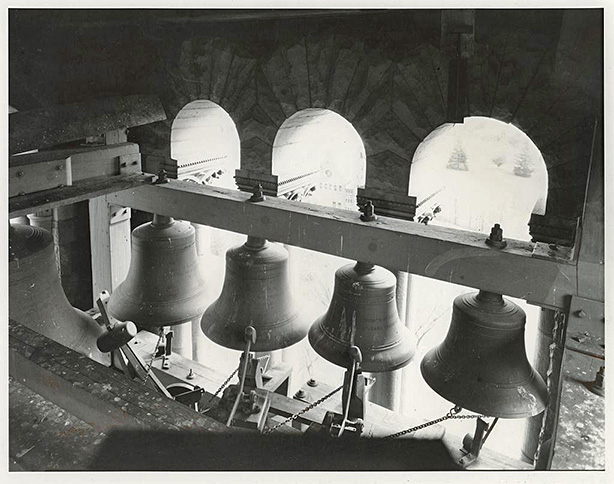
Jennie McGraw gave Cornell its original set of nine bells, which first rang at the university's opening ceremonies in 1868, hung from a temporary wooden framework. The bells moved to the top of McGraw Hall and then, finally, the library tower (now McGraw Tower) when it was completed in 1891 (pictured above). The chimes set has expanded several times; currently there are 21 bells, making it one of the largest and most frequently played chimes in the world. Photo: Division of Rare and Manuscript Collections.